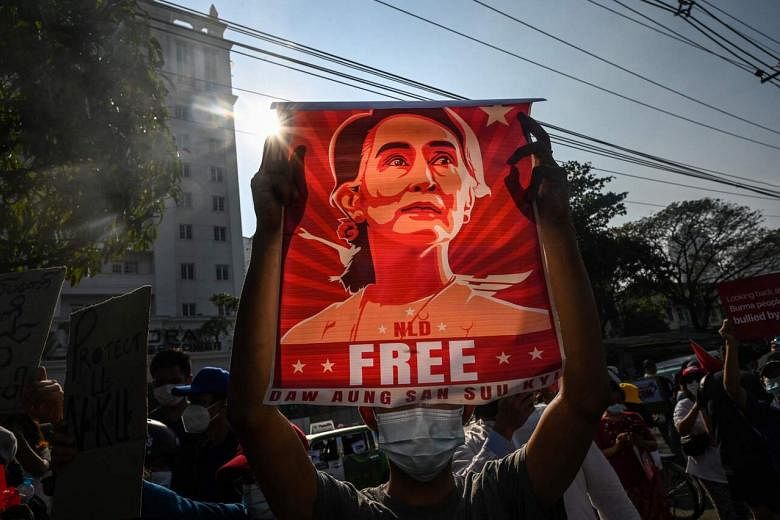BANGKOK - Myanmar's deposed state counsellor Aung San Suu Kyi has had her jail sentence reduced from four years to two years after a partial pardon by the chief of the military junta, the country's state television reported on Monday (Dec 6).
Ms Suu Kyi was earlier on Monday sentenced to four years' jail for inciting dissent and breaching Covid-19 pandemic rules.
This is the first court verdict in a series of charges levelled against her by the country's military regime.
Cambodian Prime Minister Hun Sen, meanwhile, indicated he had reached out to the Myanmar junta to try to help resolve the country's political crisis.
Mr Hun Sen, who chairs Asean next year, said on Monday that he was likely to travel to Naypyitaw to meet junta chief Min Aung Hlaing.
The Myanmar regime's foreign minister Wunna Maung Lwin is also scheduled to visit Cambodia on Tuesday, in one of the rare foreign trips by a junta member since the unpopular Feb 1 military coup.
Ms Suu Kyi, who heads the erstwhile ruling National League for Democracy (NLD) party, has been detained in an undisclosed location since the coup.
She had spent some 15 years under house arrest during Myanmar's earlier episode of military rule.
Junta spokesman Zaw Min Tun told the BBC that Ms Suu Kyi would serve her sentence where she is being detained currently, instead of being sent to prison.
It is unclear if this arrangement will apply for any other jail sentences she may receive. She faces several other charges, including corruption, breaching the official secrets law, sedition and possessing walkie-talkies illegally.
Her supporters believe these are bogus charges used to end her political career.
"We already knew they would not release her. So we have to act, to release her ourselves," wrote Facebook user Aung Thiha in Burmese after the verdict.
Malaysian legislator Charles Santiago, who chairs the Asean Parliamentarians for Human Rights, called the ruling a "travesty of justice" and said the charges against Ms Suu Kyi and dozens of other detained lawmakers "have been nothing more than an excuse by the junta to justify their illegal power grab".
United States Secretary of State Antony Blinken on Monday called for Ms Suu Kyi's release. Using the former name of Myanmar, he said: "The Burmese military regime's unjust conviction of Aung San Suu Kyi and the repression of other democratically elected officials are yet further affronts to democracy and justice in Burma."
Over in Beijing, China's Foreign Ministry spokesman Zhao Lijian said in response to a media query about the verdict: "We sincerely hope that all parties and factions in Myanmar will, in the long-term interests of the country and the nation, bridge their differences under the constitutional and legal framework and continue to promote the hard-won democratic transition process that is suitable for Myanmar's national conditions."
The 76-year-old Nobel Prize winner, who is revered by the majority of people in Myanmar as "Mother Suu", led the NLD to landslide victories in the 2015 and 2020 elections. But the latter was annulled by the junta on allegations of electoral fraud that have yet to be independently verified.
Senior General Min Aung Hlaing has pledged to hold fresh elections and end the current state of emergency by August 2023.
Ms Suu Kyi is nominally the head of the National Unity Government (NUG), an entity established in April and comprising ousted lawmakers and activists who are challenging the junta's right to rule.
Ousted president Win Myint, who was detained like Ms Suu Kyi after the coup and charged with incitement, also retains his title in the NUG.
He too, was sentenced to four years in prison on Monday on the same charges that Ms Suu Kyi faced. He also had his sentence halved by the pardon.
Ten months after the coup, the junta is still trying to quell widespread resistance to its rule.
The NUG on Sept 7 declared a "people's defensive war" against the junta and armed "people's defence forces" are waging insurgency against the military.
Violence by the military and pro-junta militias has also intensified. On Sunday, a vehicle with soldiers rammed into a crowd of unarmed protesters in Yangon, reportedly killing at least five people.
Myanmar's crisis has gripped consensus-driven Asean for much of the year. The bloc has made little headway since coming up with a blueprint to help resolve Myanmar's crisis in April. One part of this plan calls for constructive dialogue among all parties concerned, which Mr Santiago pointed out was not taking place as "the junta is keeping one of the parties in jail".
Given the junta's intransigence, Asean's remaining nine members shut Gen Min Aung Hlaing out of its leaders' summit in October, asking Myanmar to send instead a "non-political representative".
The junta did not do so, leaving Myanmar unrepresented at the meeting. This scenario was repeated during the Asean-China special summit in November.
But this situation may change after Cambodia takes over Asean's rotating chairmanship in 2022.
On Monday, Mr Hun Sen was cited by Reuters as saying: "There is a strong possibility I will visit Naypyitaw to meet General Min Aung Hlaing to work with him. If I don't work with the leadership, whom can I work with?"


